ACC307 Accounting Theory: Analysis of Managerial Pay and Incentives
VerifiedAdded on 2023/06/11
|9
|1541
|101
Report
AI Summary
This report examines accounting theory concepts related to managerial compensation and performance incentives. It discusses how organizations balance the motivation of managers with the risks associated with performance-based pay. The report analyzes the remuneration structure of a publicly listed company, focusing on the CEO's compensation, including fixed pay, short-term incentives (STI), and long-term incentives (LTI), and how these are tied to accounting performance measures like sales, EBIT, and working capital. It also addresses agency problems that arise between managers and shareholders, such as takeover attempts and differing wealth objectives, and suggests solutions like incorporating both short-term and long-term bonus structures. Finally, the report discusses lending risks for banks and the use of debt covenants and accounting information analysis to mitigate these risks. Desklib provides a platform for students to access similar solved assignments and past papers.

Running head: ACCOUNTING THEORY
Accounting Theory
Name of the Student
Name of the University
Author’s Note
Accounting Theory
Name of the Student
Name of the University
Author’s Note
Paraphrase This Document
Need a fresh take? Get an instant paraphrase of this document with our AI Paraphraser
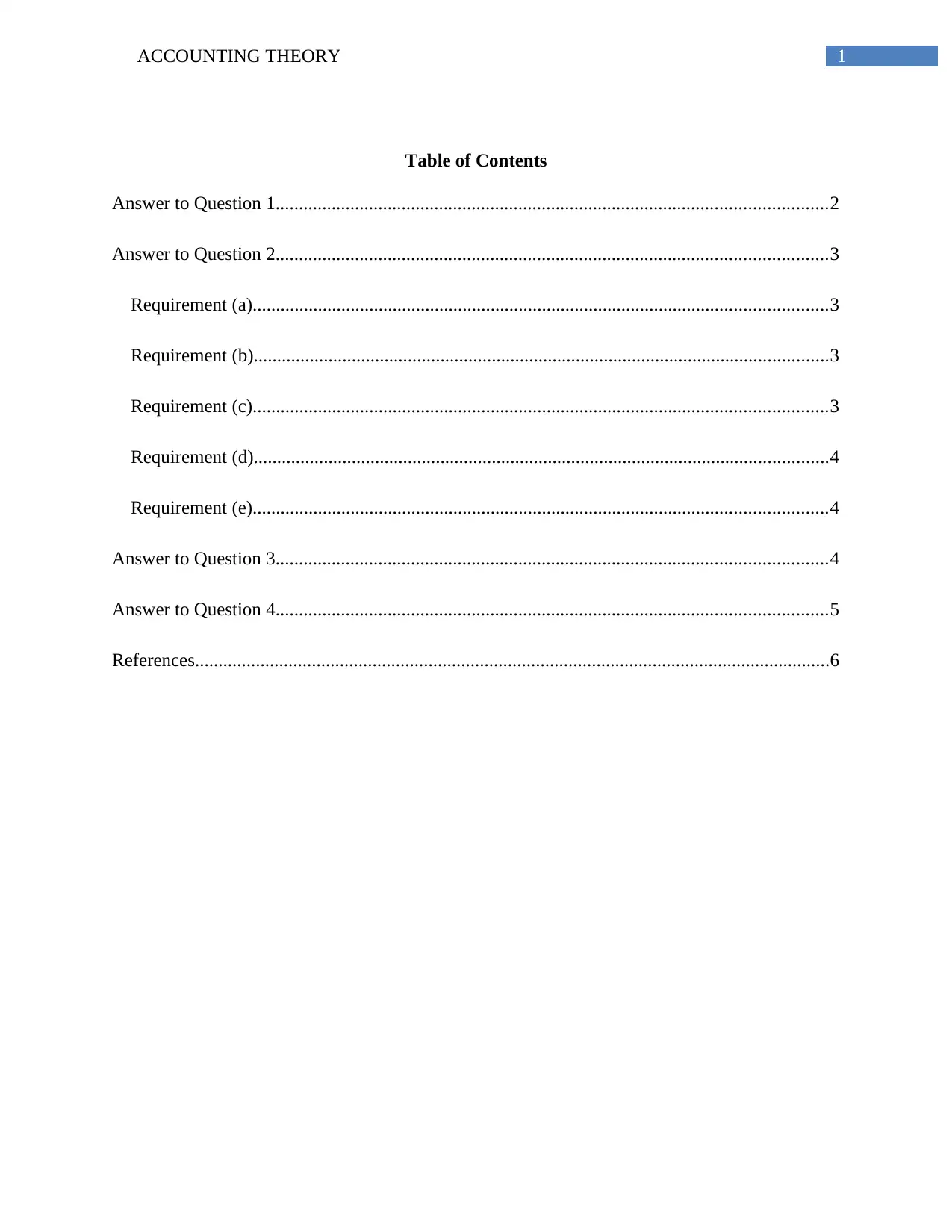
1ACCOUNTING THEORY
Table of Contents
Answer to Question 1......................................................................................................................2
Answer to Question 2......................................................................................................................3
Requirement (a)...........................................................................................................................3
Requirement (b)...........................................................................................................................3
Requirement (c)...........................................................................................................................3
Requirement (d)...........................................................................................................................4
Requirement (e)...........................................................................................................................4
Answer to Question 3......................................................................................................................4
Answer to Question 4......................................................................................................................5
References........................................................................................................................................6
Table of Contents
Answer to Question 1......................................................................................................................2
Answer to Question 2......................................................................................................................3
Requirement (a)...........................................................................................................................3
Requirement (b)...........................................................................................................................3
Requirement (c)...........................................................................................................................3
Requirement (d)...........................................................................................................................4
Requirement (e)...........................................................................................................................4
Answer to Question 3......................................................................................................................4
Answer to Question 4......................................................................................................................5
References........................................................................................................................................6
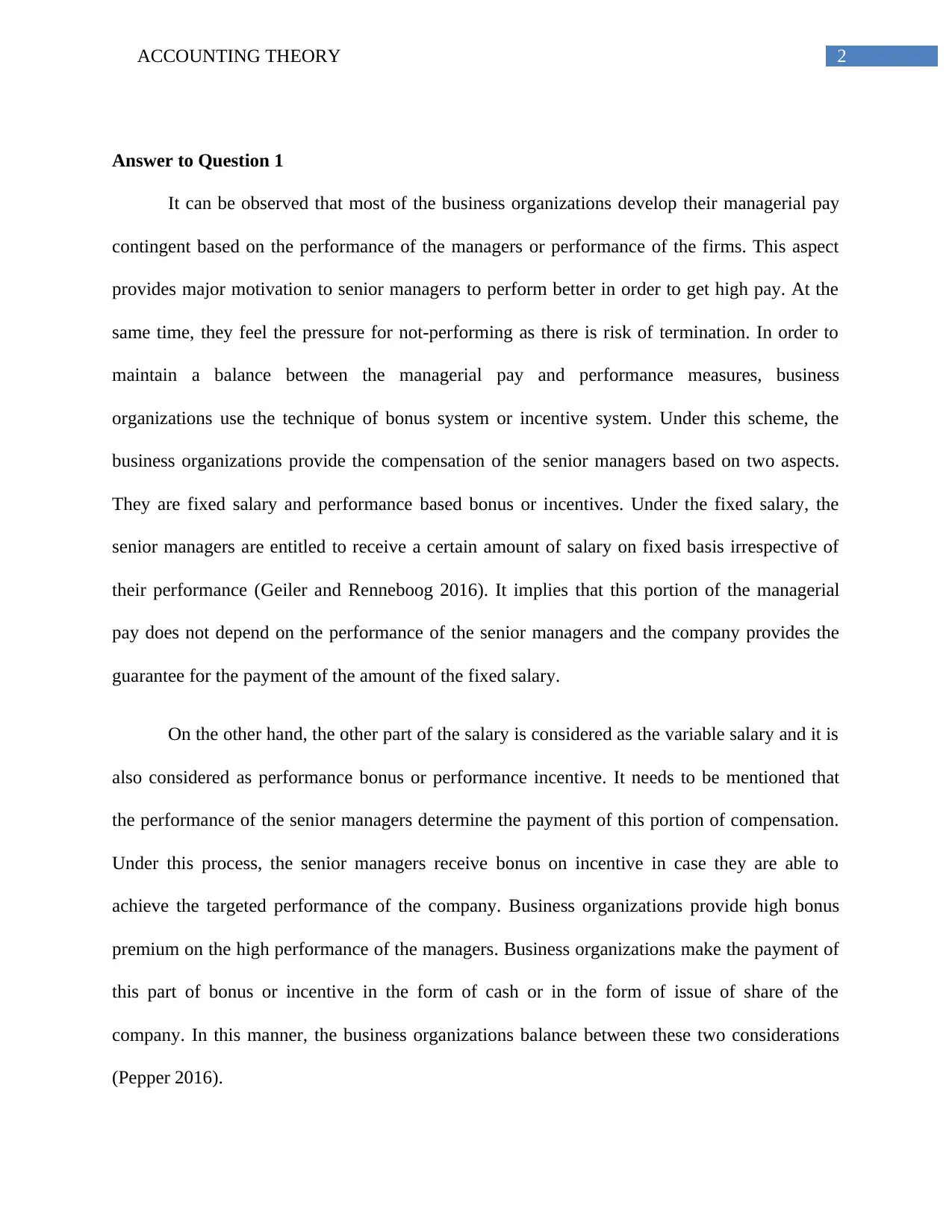
2ACCOUNTING THEORY
Answer to Question 1
It can be observed that most of the business organizations develop their managerial pay
contingent based on the performance of the managers or performance of the firms. This aspect
provides major motivation to senior managers to perform better in order to get high pay. At the
same time, they feel the pressure for not-performing as there is risk of termination. In order to
maintain a balance between the managerial pay and performance measures, business
organizations use the technique of bonus system or incentive system. Under this scheme, the
business organizations provide the compensation of the senior managers based on two aspects.
They are fixed salary and performance based bonus or incentives. Under the fixed salary, the
senior managers are entitled to receive a certain amount of salary on fixed basis irrespective of
their performance (Geiler and Renneboog 2016). It implies that this portion of the managerial
pay does not depend on the performance of the senior managers and the company provides the
guarantee for the payment of the amount of the fixed salary.
On the other hand, the other part of the salary is considered as the variable salary and it is
also considered as performance bonus or performance incentive. It needs to be mentioned that
the performance of the senior managers determine the payment of this portion of compensation.
Under this process, the senior managers receive bonus on incentive in case they are able to
achieve the targeted performance of the company. Business organizations provide high bonus
premium on the high performance of the managers. Business organizations make the payment of
this part of bonus or incentive in the form of cash or in the form of issue of share of the
company. In this manner, the business organizations balance between these two considerations
(Pepper 2016).
Answer to Question 1
It can be observed that most of the business organizations develop their managerial pay
contingent based on the performance of the managers or performance of the firms. This aspect
provides major motivation to senior managers to perform better in order to get high pay. At the
same time, they feel the pressure for not-performing as there is risk of termination. In order to
maintain a balance between the managerial pay and performance measures, business
organizations use the technique of bonus system or incentive system. Under this scheme, the
business organizations provide the compensation of the senior managers based on two aspects.
They are fixed salary and performance based bonus or incentives. Under the fixed salary, the
senior managers are entitled to receive a certain amount of salary on fixed basis irrespective of
their performance (Geiler and Renneboog 2016). It implies that this portion of the managerial
pay does not depend on the performance of the senior managers and the company provides the
guarantee for the payment of the amount of the fixed salary.
On the other hand, the other part of the salary is considered as the variable salary and it is
also considered as performance bonus or performance incentive. It needs to be mentioned that
the performance of the senior managers determine the payment of this portion of compensation.
Under this process, the senior managers receive bonus on incentive in case they are able to
achieve the targeted performance of the company. Business organizations provide high bonus
premium on the high performance of the managers. Business organizations make the payment of
this part of bonus or incentive in the form of cash or in the form of issue of share of the
company. In this manner, the business organizations balance between these two considerations
(Pepper 2016).
⊘ This is a preview!⊘
Do you want full access?
Subscribe today to unlock all pages.

Trusted by 1+ million students worldwide

3ACCOUNTING THEORY
Paraphrase This Document
Need a fresh take? Get an instant paraphrase of this document with our AI Paraphraser
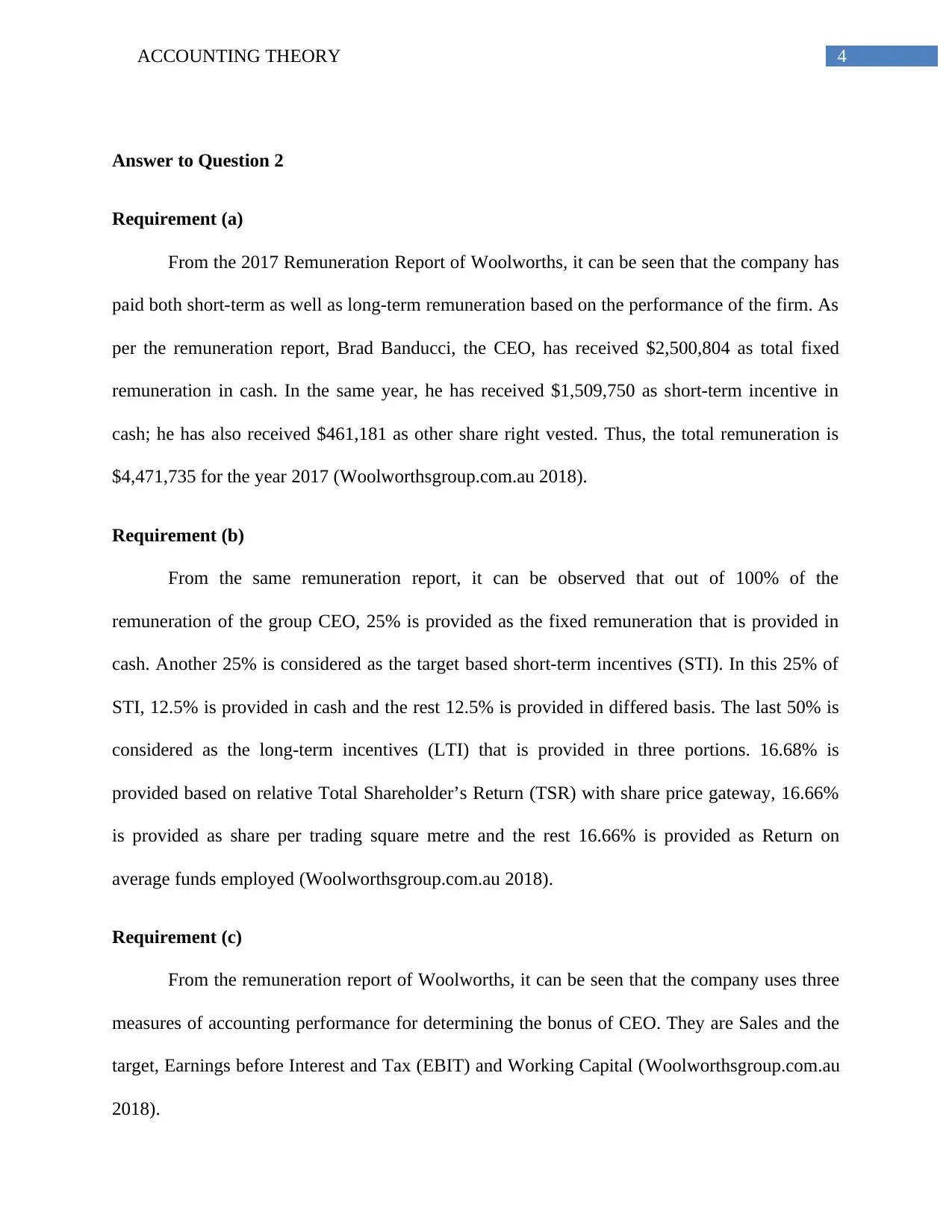
4ACCOUNTING THEORY
Answer to Question 2
Requirement (a)
From the 2017 Remuneration Report of Woolworths, it can be seen that the company has
paid both short-term as well as long-term remuneration based on the performance of the firm. As
per the remuneration report, Brad Banducci, the CEO, has received $2,500,804 as total fixed
remuneration in cash. In the same year, he has received $1,509,750 as short-term incentive in
cash; he has also received $461,181 as other share right vested. Thus, the total remuneration is
$4,471,735 for the year 2017 (Woolworthsgroup.com.au 2018).
Requirement (b)
From the same remuneration report, it can be observed that out of 100% of the
remuneration of the group CEO, 25% is provided as the fixed remuneration that is provided in
cash. Another 25% is considered as the target based short-term incentives (STI). In this 25% of
STI, 12.5% is provided in cash and the rest 12.5% is provided in differed basis. The last 50% is
considered as the long-term incentives (LTI) that is provided in three portions. 16.68% is
provided based on relative Total Shareholder’s Return (TSR) with share price gateway, 16.66%
is provided as share per trading square metre and the rest 16.66% is provided as Return on
average funds employed (Woolworthsgroup.com.au 2018).
Requirement (c)
From the remuneration report of Woolworths, it can be seen that the company uses three
measures of accounting performance for determining the bonus of CEO. They are Sales and the
target, Earnings before Interest and Tax (EBIT) and Working Capital (Woolworthsgroup.com.au
2018).
Answer to Question 2
Requirement (a)
From the 2017 Remuneration Report of Woolworths, it can be seen that the company has
paid both short-term as well as long-term remuneration based on the performance of the firm. As
per the remuneration report, Brad Banducci, the CEO, has received $2,500,804 as total fixed
remuneration in cash. In the same year, he has received $1,509,750 as short-term incentive in
cash; he has also received $461,181 as other share right vested. Thus, the total remuneration is
$4,471,735 for the year 2017 (Woolworthsgroup.com.au 2018).
Requirement (b)
From the same remuneration report, it can be observed that out of 100% of the
remuneration of the group CEO, 25% is provided as the fixed remuneration that is provided in
cash. Another 25% is considered as the target based short-term incentives (STI). In this 25% of
STI, 12.5% is provided in cash and the rest 12.5% is provided in differed basis. The last 50% is
considered as the long-term incentives (LTI) that is provided in three portions. 16.68% is
provided based on relative Total Shareholder’s Return (TSR) with share price gateway, 16.66%
is provided as share per trading square metre and the rest 16.66% is provided as Return on
average funds employed (Woolworthsgroup.com.au 2018).
Requirement (c)
From the remuneration report of Woolworths, it can be seen that the company uses three
measures of accounting performance for determining the bonus of CEO. They are Sales and the
target, Earnings before Interest and Tax (EBIT) and Working Capital (Woolworthsgroup.com.au
2018).
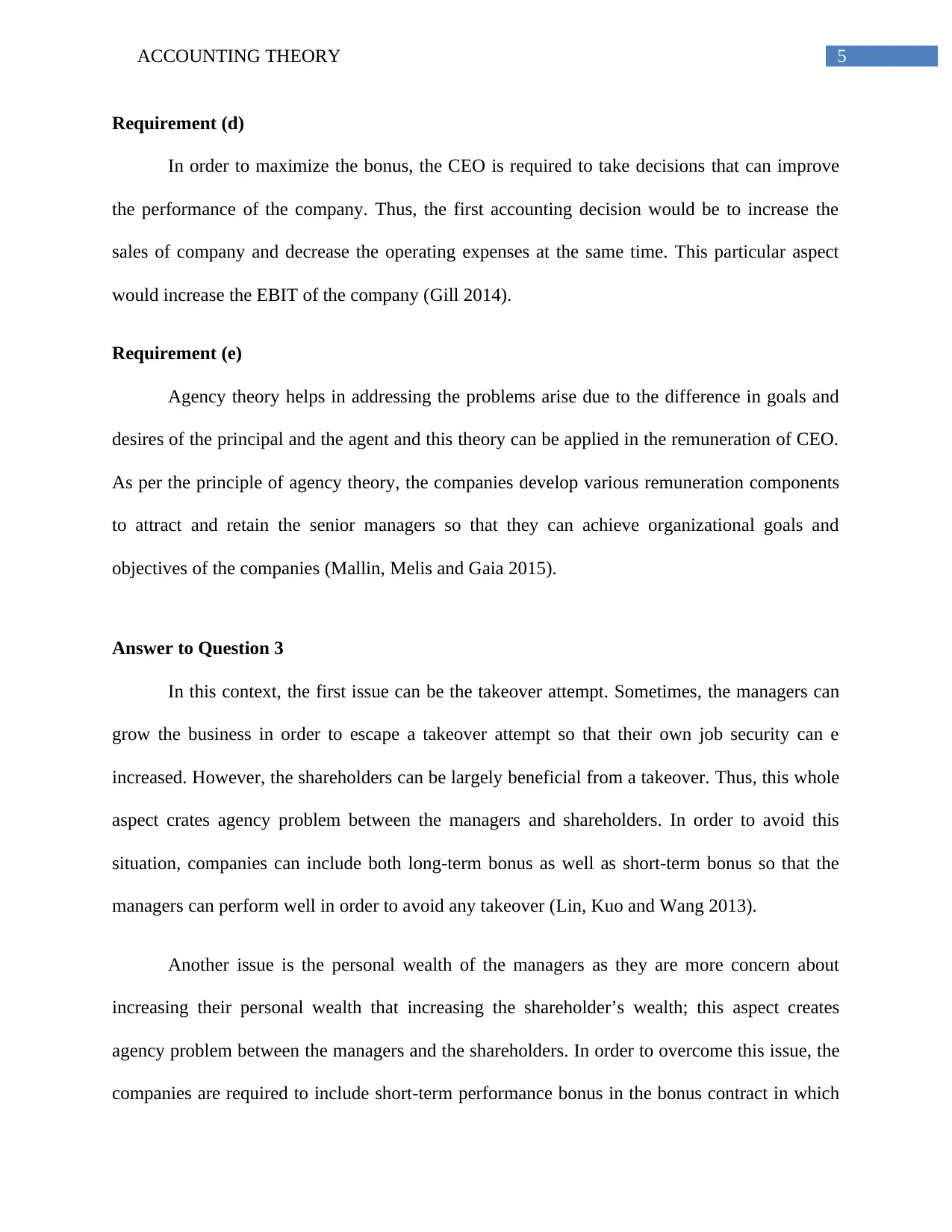
5ACCOUNTING THEORY
Requirement (d)
In order to maximize the bonus, the CEO is required to take decisions that can improve
the performance of the company. Thus, the first accounting decision would be to increase the
sales of company and decrease the operating expenses at the same time. This particular aspect
would increase the EBIT of the company (Gill 2014).
Requirement (e)
Agency theory helps in addressing the problems arise due to the difference in goals and
desires of the principal and the agent and this theory can be applied in the remuneration of CEO.
As per the principle of agency theory, the companies develop various remuneration components
to attract and retain the senior managers so that they can achieve organizational goals and
objectives of the companies (Mallin, Melis and Gaia 2015).
Answer to Question 3
In this context, the first issue can be the takeover attempt. Sometimes, the managers can
grow the business in order to escape a takeover attempt so that their own job security can e
increased. However, the shareholders can be largely beneficial from a takeover. Thus, this whole
aspect crates agency problem between the managers and shareholders. In order to avoid this
situation, companies can include both long-term bonus as well as short-term bonus so that the
managers can perform well in order to avoid any takeover (Lin, Kuo and Wang 2013).
Another issue is the personal wealth of the managers as they are more concern about
increasing their personal wealth that increasing the shareholder’s wealth; this aspect creates
agency problem between the managers and the shareholders. In order to overcome this issue, the
companies are required to include short-term performance bonus in the bonus contract in which
Requirement (d)
In order to maximize the bonus, the CEO is required to take decisions that can improve
the performance of the company. Thus, the first accounting decision would be to increase the
sales of company and decrease the operating expenses at the same time. This particular aspect
would increase the EBIT of the company (Gill 2014).
Requirement (e)
Agency theory helps in addressing the problems arise due to the difference in goals and
desires of the principal and the agent and this theory can be applied in the remuneration of CEO.
As per the principle of agency theory, the companies develop various remuneration components
to attract and retain the senior managers so that they can achieve organizational goals and
objectives of the companies (Mallin, Melis and Gaia 2015).
Answer to Question 3
In this context, the first issue can be the takeover attempt. Sometimes, the managers can
grow the business in order to escape a takeover attempt so that their own job security can e
increased. However, the shareholders can be largely beneficial from a takeover. Thus, this whole
aspect crates agency problem between the managers and shareholders. In order to avoid this
situation, companies can include both long-term bonus as well as short-term bonus so that the
managers can perform well in order to avoid any takeover (Lin, Kuo and Wang 2013).
Another issue is the personal wealth of the managers as they are more concern about
increasing their personal wealth that increasing the shareholder’s wealth; this aspect creates
agency problem between the managers and the shareholders. In order to overcome this issue, the
companies are required to include short-term performance bonus in the bonus contract in which
⊘ This is a preview!⊘
Do you want full access?
Subscribe today to unlock all pages.

Trusted by 1+ million students worldwide
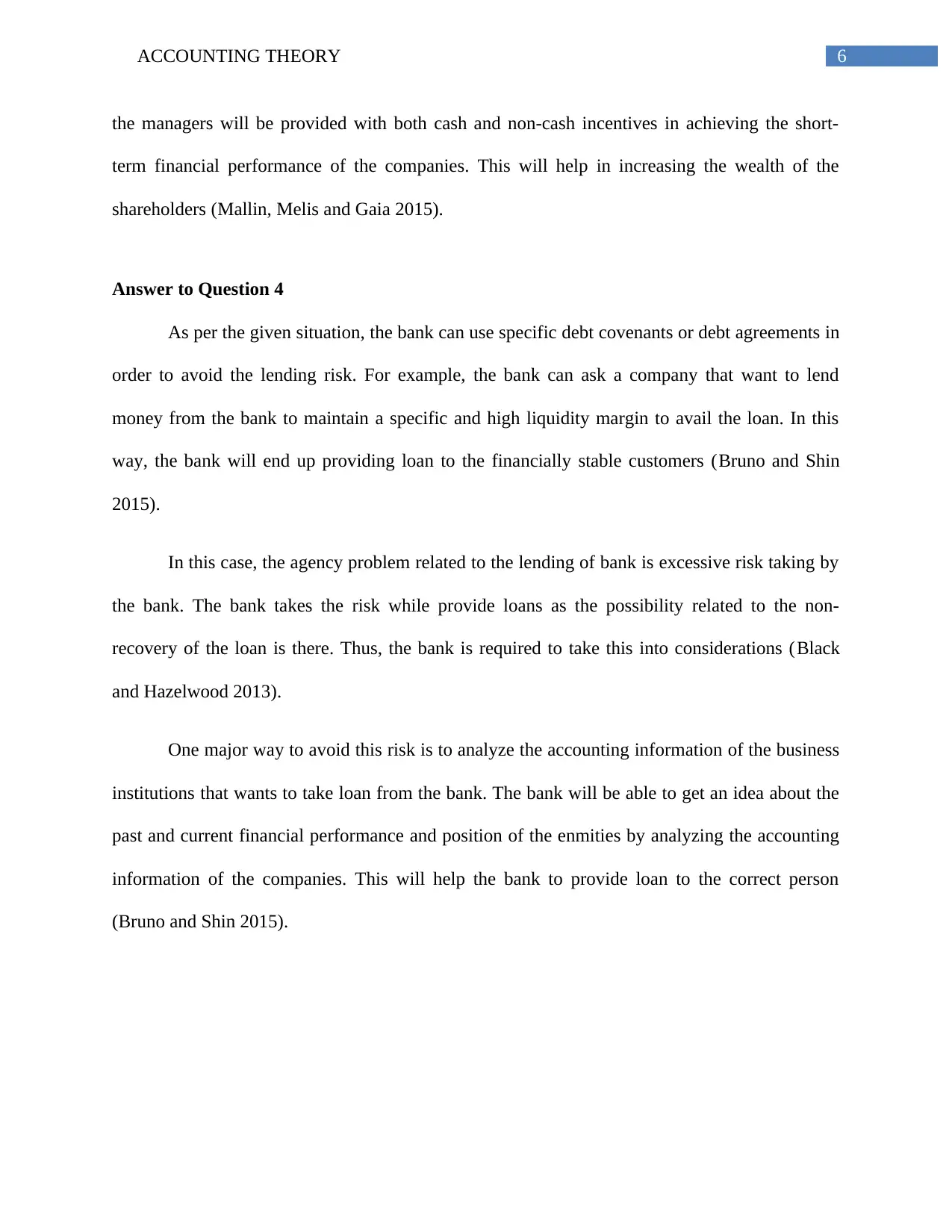
6ACCOUNTING THEORY
the managers will be provided with both cash and non-cash incentives in achieving the short-
term financial performance of the companies. This will help in increasing the wealth of the
shareholders (Mallin, Melis and Gaia 2015).
Answer to Question 4
As per the given situation, the bank can use specific debt covenants or debt agreements in
order to avoid the lending risk. For example, the bank can ask a company that want to lend
money from the bank to maintain a specific and high liquidity margin to avail the loan. In this
way, the bank will end up providing loan to the financially stable customers (Bruno and Shin
2015).
In this case, the agency problem related to the lending of bank is excessive risk taking by
the bank. The bank takes the risk while provide loans as the possibility related to the non-
recovery of the loan is there. Thus, the bank is required to take this into considerations (Black
and Hazelwood 2013).
One major way to avoid this risk is to analyze the accounting information of the business
institutions that wants to take loan from the bank. The bank will be able to get an idea about the
past and current financial performance and position of the enmities by analyzing the accounting
information of the companies. This will help the bank to provide loan to the correct person
(Bruno and Shin 2015).
the managers will be provided with both cash and non-cash incentives in achieving the short-
term financial performance of the companies. This will help in increasing the wealth of the
shareholders (Mallin, Melis and Gaia 2015).
Answer to Question 4
As per the given situation, the bank can use specific debt covenants or debt agreements in
order to avoid the lending risk. For example, the bank can ask a company that want to lend
money from the bank to maintain a specific and high liquidity margin to avail the loan. In this
way, the bank will end up providing loan to the financially stable customers (Bruno and Shin
2015).
In this case, the agency problem related to the lending of bank is excessive risk taking by
the bank. The bank takes the risk while provide loans as the possibility related to the non-
recovery of the loan is there. Thus, the bank is required to take this into considerations (Black
and Hazelwood 2013).
One major way to avoid this risk is to analyze the accounting information of the business
institutions that wants to take loan from the bank. The bank will be able to get an idea about the
past and current financial performance and position of the enmities by analyzing the accounting
information of the companies. This will help the bank to provide loan to the correct person
(Bruno and Shin 2015).
Paraphrase This Document
Need a fresh take? Get an instant paraphrase of this document with our AI Paraphraser
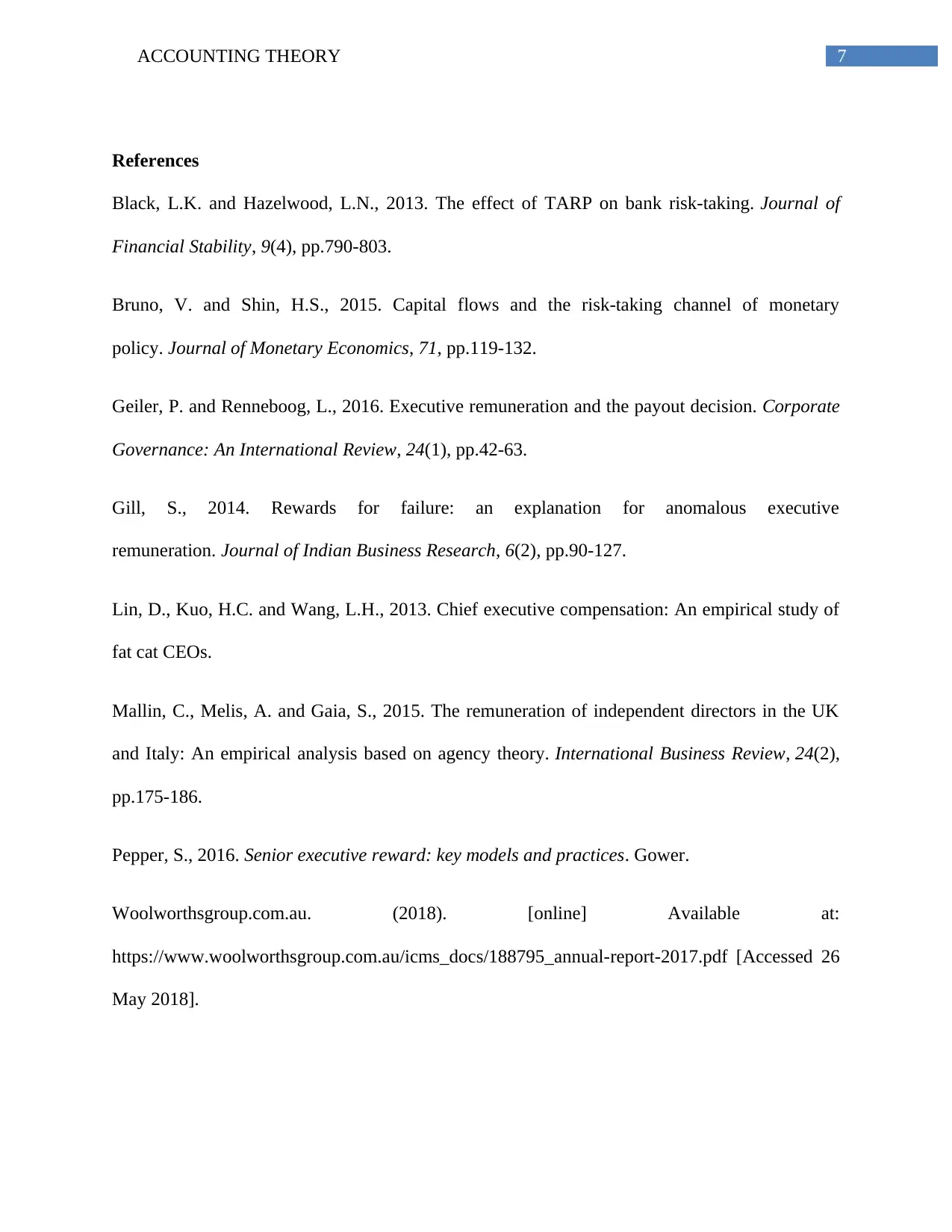
7ACCOUNTING THEORY
References
Black, L.K. and Hazelwood, L.N., 2013. The effect of TARP on bank risk-taking. Journal of
Financial Stability, 9(4), pp.790-803.
Bruno, V. and Shin, H.S., 2015. Capital flows and the risk-taking channel of monetary
policy. Journal of Monetary Economics, 71, pp.119-132.
Geiler, P. and Renneboog, L., 2016. Executive remuneration and the payout decision. Corporate
Governance: An International Review, 24(1), pp.42-63.
Gill, S., 2014. Rewards for failure: an explanation for anomalous executive
remuneration. Journal of Indian Business Research, 6(2), pp.90-127.
Lin, D., Kuo, H.C. and Wang, L.H., 2013. Chief executive compensation: An empirical study of
fat cat CEOs.
Mallin, C., Melis, A. and Gaia, S., 2015. The remuneration of independent directors in the UK
and Italy: An empirical analysis based on agency theory. International Business Review, 24(2),
pp.175-186.
Pepper, S., 2016. Senior executive reward: key models and practices. Gower.
Woolworthsgroup.com.au. (2018). [online] Available at:
https://www.woolworthsgroup.com.au/icms_docs/188795_annual-report-2017.pdf [Accessed 26
May 2018].
References
Black, L.K. and Hazelwood, L.N., 2013. The effect of TARP on bank risk-taking. Journal of
Financial Stability, 9(4), pp.790-803.
Bruno, V. and Shin, H.S., 2015. Capital flows and the risk-taking channel of monetary
policy. Journal of Monetary Economics, 71, pp.119-132.
Geiler, P. and Renneboog, L., 2016. Executive remuneration and the payout decision. Corporate
Governance: An International Review, 24(1), pp.42-63.
Gill, S., 2014. Rewards for failure: an explanation for anomalous executive
remuneration. Journal of Indian Business Research, 6(2), pp.90-127.
Lin, D., Kuo, H.C. and Wang, L.H., 2013. Chief executive compensation: An empirical study of
fat cat CEOs.
Mallin, C., Melis, A. and Gaia, S., 2015. The remuneration of independent directors in the UK
and Italy: An empirical analysis based on agency theory. International Business Review, 24(2),
pp.175-186.
Pepper, S., 2016. Senior executive reward: key models and practices. Gower.
Woolworthsgroup.com.au. (2018). [online] Available at:
https://www.woolworthsgroup.com.au/icms_docs/188795_annual-report-2017.pdf [Accessed 26
May 2018].

8ACCOUNTING THEORY
⊘ This is a preview!⊘
Do you want full access?
Subscribe today to unlock all pages.

Trusted by 1+ million students worldwide
1 out of 9
Related Documents
Your All-in-One AI-Powered Toolkit for Academic Success.
+13062052269
info@desklib.com
Available 24*7 on WhatsApp / Email
![[object Object]](/_next/static/media/star-bottom.7253800d.svg)
Unlock your academic potential
Copyright © 2020–2025 A2Z Services. All Rights Reserved. Developed and managed by ZUCOL.





